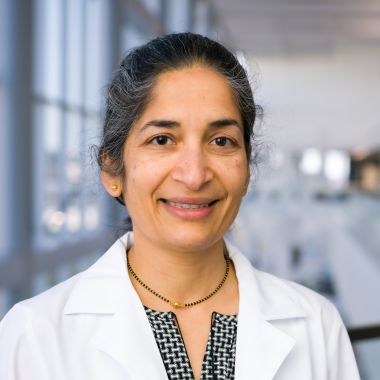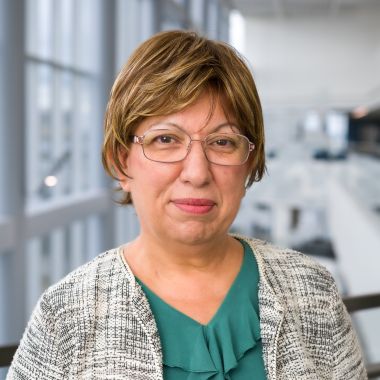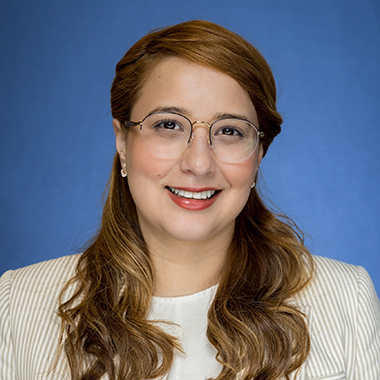Student Voices

Charuta Joshi, M.D.
What interested you in the M.S.C.I. program?
“I am a clinician but had always felt inadequate or like a bit of an imposter when discussing clinical research, and this program filled that need.”
- Read More
What have you gained from the M.S.C.I. program?
“This program was oxygen for me as a new hire at UTSW. It allowed me new contacts, took my mind off uncertainty, and helped me gain a solid basis in applicable biostatistics, epidemiology, and grant-writing techniques.”How did you manage to fit the M.S.C.I. program into your work schedule?
“It did take some planning and reorganization, but I had my division chief’s support. I rearranged some of my calls and clinic days so that on days when I had a.m. and p.m. classes I would have no clinic. I did have to work harder to fit in everything in my cFTE schedule.”How did the M.S.C.I. program help advance your career?
“I was able to secure industry-sponsored funding right as I finished my first year. I was also introduced through my classes to wonderful colleagues who spurred me on, allowing me to make new contacts through UTSW.”

Emily Melikman
What interested you in the M.S.C.I. program?
“I was interested in the M.S.C.I. program because it is helping me build the foundation for future Ph.D. work.”
- Read More
What have you gained from the M.S.C.I. program?
“It was a great experience for me! I improved my skills in all aspects of clinical investigation, including protocol development, data analysis, and grant preparation. I would say the program provided a learning context that drives innovations.”How did you manage to fit the M.S.C.I. program into your work schedule?
“The program offers flexibility for incorporating its requirements into the work schedule. There are opportunities for online coursework, in addition to the in-person classes.”How did the M.S.C.I. program help advance your career?
“I am international scientist and working to rebuild my science career. The program was a great opportunity for helping me reach my career goals.”

Karen Castro Ochoa
What interested you in the M.S.C.I. program?
“I was drawn to the M.S.C.I. program at UTSW because I believe it will help me become a well-rounded clinical research professional by bridging scientific training with practical applications in clinical research. As a non-physician, I see this program as an opportunity to expand my expertise beyond administration – such as data management, finances, and regulations – to include research design and methodology, clinical knowledge and practices, data analysis, manuscript writing, grant applications and funding strategies, and the dissemination of research findings through publications and presentations. At the same time, I aim to hone the leadership and administrative skills necessary to support and effectively lead professionally diverse teams.”
- Read More
What interested you in the M.S.C.I. program? (continued)
“I have been fortunate to find fulfillment in clinical research by witnessing firsthand how clinicians and non-clinicians collaborate to expand knowledge, develop new therapies, and improve access to care for patients impacted by deficiencies or gaps in the standard of care. I firmly believe that every clinical research professional in leadership should be equipped to support all areas of a research team. The program’s focus on translational research particularly resonates with me, as it aligns with my goal of contributing to meaningful advancements in bench-to-bedside research, whether within academic institutions or in pharmaceutical R&D.”“UTSW’s reputation for excellence in academic research and medical education makes it the ideal place for this program, considering the resources and expertise it offers. There are several programs available to working professionals, but the program's vision and the credentials of the institution and its leaders were of particular interest to me.”
What have you gained from the M.S.C.I. program?
“I am still working through the program, but I am confident it will provide exactly what I am seeking. Thus far, the program has enhanced my ability to critically evaluate research, support and advise team members in my current role, and confidently lead clinical investigations. So far, I have gained a strong foundation in bridging operational expertise with impactful science. For non-physicians, this program offers tools to lead and innovate in the field. Additionally, the opportunity to network with clinicians at the forefront of their disciplines has been an invaluable experience.”How did you manage to fit the M.S.C.I. program into your work schedule?
“I am fortunate to have the support of my leadership at my current job, as they recognize that the skills I gain through this program will not only benefit me as a professional but also enhance the institution I serve. Enrolled in the program part-time, I can manage the class schedule by arranging early departures or late arrivals on specific days without disrupting operations. Additionally, the program offers online courses, which provide flexibility to attend from home or the office as needed.”How did the M.S.C.I. program help advance your career?
“The M.S.C.I. program is helping me expand and strengthen my skills in translational investigation, bridging the gap between clinical research and real-world applications while creating opportunities for targeted collaboration with pharmaceutical research and development. Additionally, the program is deepening my understanding of the complexities of academic research leadership, positioning me for roles that drive innovation and foster collaboration across various institutions. Overall, the M.S.C.I. program is broadening the scope of my career possibilities within the clinical research industry.”
